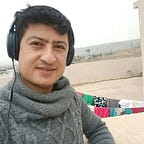Bartellah: Hitchhiking for a Song of Hope
Two weeks ago, I took the opportunity to hitchhike with my trusted friend, Levi, to the Iraqi territories outside of the Kurdistan region. Our mission was a simple yet important one. At a time when we are often overwhelmed with images of destruction and inhumanity, our mission was to instead capture moments of hope in post war-times, as well as convey a true reflection of the people living there. Our journey there could not be called entirely risk-free. Despite not having a valid visa, Levi bravely endured the many checkpoints, and passed through them successfully (thanks to his newly grown “Middle Eastern mustache”). We finally reached Bartellah, which is a town mostly inhabited, throughout history, by minority groups, and those who fled the sectarian and ethnic violence in the nearby city of Mosul post-2003. The town itself was then captured by ISIS in 2014, forcing inhabitants to flee again, in search of a safer place. When, we reached Bartellah, we walked through its narrow streets until we arrived at the town’s main church. We entered the beautiful, impressive looking building to find a buzz of activity; restoration work was taking place inside. We were introduced to the priest and learned that the church, like many other ones, was burned by the militants of ISIS who were occupying the town at the time. After the town’s liberation from ISIS control, the church was restored again, all except for one corner which still shows the marks of destruction caused by the fire.
During our visit to the church, I felt inspired to sing a Christian song in Syriani, a dialect which belongs to a group of languages known as Aramaic, and is historically considered to be close to the language spoken by Jesus Christ. In fact, Syriani is not my first language. I was born in Mosul, and my family members didn’t speak any other languages besides Arabic in the house. Generally speaking, Syriac orthodox people had do give up the language when they settled in Mosul. As a result, losing the Syrianai language is something that happened to many Christian groups while living in Mosul. I am not entirely sure why this happened, but there was little emphasis on preserving the culture. It was a task assigned to the church. Therefore, by attending church every Sunday with my family, I was able to memorize the prayers and songs; learning more and more about the Syriani language.
According to the Syriac tradition, the song I sang is always performed by the group of worshipers just before the priest announces the opening of the service. Having the opportunity to perform such a beautiful song in a place that had been victim to atrocities, but was still standing in the face of adversity was a profound spiritual experience for me. I was very fortunate that Levi was there, not only to capture the moment in film, but to also witness and share with me the moment I connected to my Christian roots. I am sharing the video of the song, brilliantly shot and edited by Levi, along with photos of some recovered burned artifacts from the fire, the restored part of the church, and the unrestored corner.
